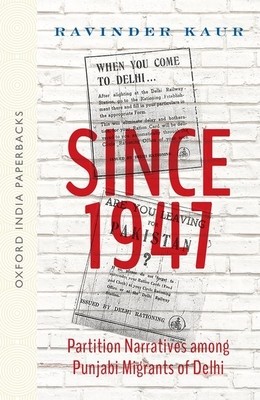
- We will send in 10–14 business days.
- Author: Ravinder Kaur
- Publisher: Oxford University Press, USA
- ISBN-10: 0199483574
- ISBN-13: 9780199483570
- Format: 13.7 x 21.3 x 2 cm, minkšti viršeliai
- Language: English
- SAVE -10% with code: EXTRA
Reviews
Description
Since 1947 is about a series of events-the departure of the British, the inauguration of the post-colonial Indian state, and an unprecedented forced migration that followed Partition. Most importantly, it summarizes the nearly six decade-long efforts at restoring the loss of homes, livelihoods, and national territory in 1947. This study tells the story of Hindus and Sikhs from the North West Frontier Province and West Punjab who made India's capital their new home. Based on the everyday life of the migrants in three resettlement colonies, the book focuses on the period between 1947 and 1965-from the time of Partition till the official closure of resettlement work. It shows how Partition stands as a living theme, a point of reference for the Delhi Punjabis. The narrative is woven with memories of lived and inherited experiences and national histories of Partition. The refugees' journey towards becoming 'locals' is mapped through an exploration of their coping strategies, and
gradual identification with the Indian state. This work, thus, shifts focus from standard debates on Hindus-Muslims, Congress party-Muslim League, India-Pakistan, and opens up the inquiry to uncharted territory. Ravinder Kaur also challenges narratives that represent migration as chaotic, disorderly, and hurried. Using personal and governmental narratives, she shows that the population movement-layered by multiple levels of class, caste and gender experience-was far more complicated than we popularly imagine. The author revisits this book with a new introduction in the paperback edition.
EXTRA 10 % discount with code: EXTRA
The promotion ends in 21d.12:43:15
The discount code is valid when purchasing from 10 €. Discounts do not stack.
- Author: Ravinder Kaur
- Publisher: Oxford University Press, USA
- ISBN-10: 0199483574
- ISBN-13: 9780199483570
- Format: 13.7 x 21.3 x 2 cm, minkšti viršeliai
- Language: English English
Since 1947 is about a series of events-the departure of the British, the inauguration of the post-colonial Indian state, and an unprecedented forced migration that followed Partition. Most importantly, it summarizes the nearly six decade-long efforts at restoring the loss of homes, livelihoods, and national territory in 1947. This study tells the story of Hindus and Sikhs from the North West Frontier Province and West Punjab who made India's capital their new home. Based on the everyday life of the migrants in three resettlement colonies, the book focuses on the period between 1947 and 1965-from the time of Partition till the official closure of resettlement work. It shows how Partition stands as a living theme, a point of reference for the Delhi Punjabis. The narrative is woven with memories of lived and inherited experiences and national histories of Partition. The refugees' journey towards becoming 'locals' is mapped through an exploration of their coping strategies, and
gradual identification with the Indian state. This work, thus, shifts focus from standard debates on Hindus-Muslims, Congress party-Muslim League, India-Pakistan, and opens up the inquiry to uncharted territory. Ravinder Kaur also challenges narratives that represent migration as chaotic, disorderly, and hurried. Using personal and governmental narratives, she shows that the population movement-layered by multiple levels of class, caste and gender experience-was far more complicated than we popularly imagine. The author revisits this book with a new introduction in the paperback edition.


Reviews